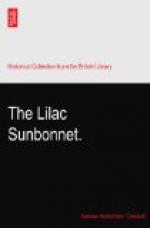“Sun down, now, children, and play on the grass,” she said. “Sun, chicks—off with you—shoo!” and she flirted her apron after them as she did when she scattered the chickens from the dairy door. The pinafored people fled shrieking across the grass, tumbling over each other in riotous heaps.
Then Winsome went over and kissed her husband. He was looking so handsome that he deserved it. And she did not do it too often. She was glad that she had made him wear a beard. She put one of her hands behind his head and the other beneath his chin, tilting his profile with the air of a connoisseur. This can only be done in one position.
“Well, does it suit your ladyship?” said Ralph.
She gave him a little box on the ear.
“I knew,” he said, “that you wanted to come and sit on my knee!”
“I never did,” replied Winsome with animation, making a statement almost certainly inaccurate upon the face of it.
“That’s why you sent away the children,” he went on, pinching her ear.
“Of all things in this world,” said Winsome indignantly, “commend me to a man for conceit!”
“And to winsome wives for wily ways!” said her husband instantly. To do him justice, he did not often do this sort of thing.
“Keep the alliteration for the poems,” retorted Winsome. “Truth will do for me.”
After a little while she said, without apparent connection:
“It is very hot.”
“What are they doing in the hay-field?” asked Ralph.
“Jock Forrest was leading and they were cutting down the croft very steadily. I think it looks like sixty bushels to the acre,” she continued practically; “so you shall have a carpet for the study this year, if all goes well.”
“That will be famous!” cried Ralph, like a schoolboy, waving his hand. It paused among Winsome’s hair.
“I wish you would not tumble it all down,” she said; “I am too old for that kind of thing now!”
The number of times good women perjure themselves is almost unbelievable.
But the recording angel has, it is said, a deaf side, otherwise he would need an ink-eraser. Ralph knew very well what she really meant, and continued to throw the fine-spun glossy waves over her head, as a miser may toss his gold for the pleasure of the cool, crisp touch.
“Then,” continued Winsome, without moving (for, though so unhappy and uncomfortable, she sat still—some women are born with a genius for martyrdom), “then I had a long talk with Meg.”
“And the babe?” queried Ralph, letting her hair run through his fingers.
“And the babe,” said Winsome; “she had laid it to sleep under a stock, and when we went to see, it looked so sweet under the narrow arch of the corn! Then it looked up with big wondering eyes. I believe he thought the inside of the stook was as high as a temple.”
“It is not I that am the poet!” said Ralph, transferring his attention for a moment from her hair.




